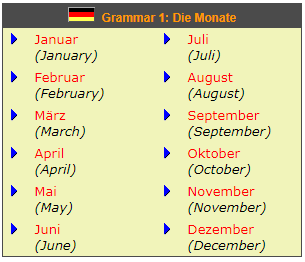In Austria, the word for January is Jänner.
You would translate "in January", "in February" etc. as im Januar, im Februar.
All German months are masculine.
The German word for a month is der Monat (-e).
Grammar 2: What's the date today?
Der Wievielte ist heute?
(Literally: "The how many-th is it today?")
Den Wievielten haben wir heute?
(Literally: "The how many-th do we have today?")
Grammar 3: Today is...
"Der Wievielte ist heute?"
Heute ist der Vierte
(Literally: "Today is the fourth")
Heute ist der vierte Mai
(Literally: "Today is the fourth of May")
Heute ist Mittwoch, der vierte Mai
(Literally: "Today is Wednesday the fourth of May")
"Den Wievielten haben wir heute?"
Heute haben wir den Vierten
(Literally: "Today is the fourth")
Heute haben wir den vierten Mai
(Literally: "Today is the fourth of May")
Writing the date
Unlike English which has several variations ("May 4", "May 4th", "4th May" etc.), the abbreviated form of the German date is always written the same way - der 4. Mai. If you are also giving the date you would write: 4. Mai 2008
At the head of letters, the date is given in the order day, month, year preceded by the definite article in the accusative case. Thus "May 4, 2008" would appear in a letter heading as den 4.5.2008. You can also precede the date by stating your location - i.e. Portsmouth, den 4.5.2008.
If you wish to have a fuller explanation of how to write the date in German letters, click here for the relevant page on my guide to "How to Write Letters in German".
Years
The German word for a year is "das Jahr (-e)" You have two options when translating "in 2008", neither of which is identical with the English version! The German equivalents are either "im Jahre 2008" or simply "2008" without a preposition.
When years are spoken in Germany, you would simply say "two thousand" plus the number of years that follows. Therefore 2008 would be spoken as zweitausendacht. Years in the last century are spoken by forming two blocks, the first containing the number of "hundred" years, much in the same way as we do in English. Thus 1999 would be neunzehnhundertneunundneunzig (literally: "nineteen hundred ninety-nine"). Note that the word "hundert" is always included in German wheras it can be omitted in English.





